14 start with S start with S
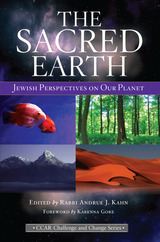
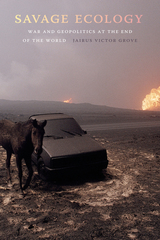
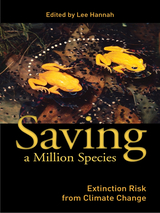
The research paper "Extinction Risk from Climate Change" published in the journal Nature in January 2004 created front-page headlines around the world. The notion that climate change could drive more than a million species to extinction captured both the popular imagination and the attention of policy-makers, and provoked an unprecedented round of scientific critique.
Saving a Million Species reconsiders the central question of that paper: How many species may perish as a result of climate change and associated threats? Leaders from a range of disciplines synthesize the literature, refine the original estimates, and elaborate the conservation and policy implications.
The book:
- examines the initial extinction risk estimates of the original paper, subsequent critiques, and the media and policy impact of this unique study
- presents evidence of extinctions from climate change from different time frames in the past
- explores extinctions documented in the contemporary record
- sets forth new risk estimates for future climate change
- considers the conservation and policy implications of the estimates.
Saving a Million Species offers a clear explanation of the science behind the headline-grabbing estimates for conservationists, researchers, teachers, students, and policy-makers. It is a critical resource for helping those working to conserve biodiversity take on the rapidly advancing and evolving global stressor of climate change-the most important issue in conservation biology today, and the one for which we are least prepared.
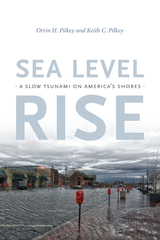

Chapters explore mountain weather, avalanches and snow safety, historical accounts of weather events and snow conditions, and the basics of climate and weather forecasting. Steenburgh explains what creates the best snow for skiing and snowboarding in accurate and accessible language and illustrates his points with 150 color photographs, making Secrets of the Greatest Snow on Earth a helpful tool for planning vacations and staying safe during mountain adventures. Snowriders, weather enthusiasts, meteorologists, students of snow science, and anyone who dreams of deep powder and bluebird skies will want to get their gloves on Secrets of the Greatest Snow on Earth.
Watch Book Trailer!(Special thanks to Ski Utah)
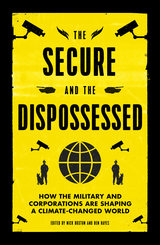
The Secure and the Dispossessed gathers together essays by high-profile journalists, academics, and activists, including Christian Parenti, Nafeez Ahmed, and policy analyst Oscar Reyes. They offer a close and critical guide to questions about climate change, showing how they converge with questions about international security and global economic power, as new natural resources become available. This book is an essential guide to the key environmental and political debates which will shape future policies and elections: how managing the world’s supply of oil and gas can be squared with the environmental impact of our continued reliance on those very same fossil fuels.
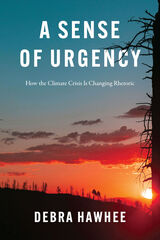
Why is it difficult to talk about climate change? Debra Hawhee argues that contemporary rhetoric relies on classical assumptions about humanity and history that cannot conceive of the present crisis. How do we talk about an unprecedented future or represent planetary interests without privileging our own species? A Sense of Urgency explores four emerging answers, their sheer novelty a record of both the devastation and possible futures of climate change. In developing the arts of magnitude, presence, witness, and feeling, A Sense of Urgency invites us to imagine new ways of thinking with our imperiled planet.
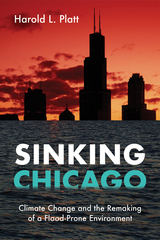
In Sinking Chicago, Harold Platt shows how people responded to climate change in one American city over a hundred-and-fifty-year period. During a long dry spell before 1945, city residents lost sight of the connections between land use, flood control, and water quality. Then, a combination of suburban sprawl and a wet period of extreme weather events created damaging runoff surges that sank Chicago and contaminated drinking supplies with raw sewage.
Chicagoans had to learn how to remake a city built on a prairie wetland. They organized a grassroots movement to protect the six river watersheds in the semi-sacred forest preserves from being turned into open sewers, like the Chicago River. The politics of outdoor recreation clashed with the politics of water management. Platt charts a growing constituency of citizens who fought a corrupt political machine to reclaim the region’s waterways and Lake Michigan as a single eco-system. Environmentalists contested policymakers’ heroic, big-technology approaches with small-scale solutions for a flood-prone environment. Sinking Chicago lays out a roadmap to future planning outcomes.
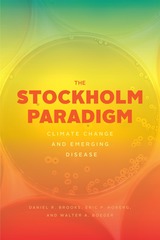
As this book reveals, a new understanding of the evolution of pathogen-host systems, called the Stockholm Paradigm, explains what is happening. The planet is a minefield of pathogens with preexisting capacities to infect susceptible but unexposed hosts, needing only the opportunity for contact. Climate change has always been the major catalyst for such new opportunities, because it disrupts local ecosystem structure and allows pathogens and hosts to move. Once pathogens expand to new hosts, novel variants may emerge, each with new infection capacities. Mathematical models and real-world examples uniformly support these ideas. Emerging disease is thus one of the greatest climate change–related threats confronting humanity.
Even without deadly global catastrophes on the scale of the 1918 Spanish Influenza pandemic, emerging diseases cost humanity more than a trillion dollars per year in treatment and lost productivity. But while time is short, the danger is great, and we are largely unprepared, the Stockholm Paradigm offers hope for managing the crisis. By using the DAMA (document, assess, monitor, act) protocol, we can “anticipate to mitigate” emerging disease, buying time and saving money while we search for more effective ways to cope with this challenge.
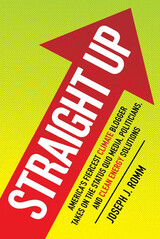
Straight Up draws on Romm’s most important posts to explain the dangers of and solutions to climate change that you won’t find in newspapers, in journals, or on T.V. Compared to coverage of Jay-Z or the latest philandering politician, climate change makes up a pathetically small share of news reports. And when journalists do try to tackle this complex issue, they often lack the background to tell the full story. Despite the dearth of reporting, polls show that two in five Americans think the press is actually exaggerating the threat of climate change. That gives Big Oil, and others with a vested interest in the status quo, a huge opportunity to mislead the public.
Romm cuts through the misinformation and presents the truth about humanity’s most dire threat. His analysis is based on sophisticated knowledge of renewable technologies, climate impacts, and government policy, written in a style everyone can understand. Romm shows how a 20 percent reduction in global emissions over the next quarter century could improve the economy; how we can replace most coal and with what technologies; why Sarah Palin wears a polar bear pin; and why controversial, emerging technologies like biochar have to be part of the solution.
The ultimate solution, Romm argues, is bigger than any individual technology: it’s citizen action. Without public pressure, Washington and industry don’t budge. With it, our grandkids might just have a habitable place to live.
“The Web’s most influential climate-change blogger” and “Hero of the Environment 2009”
—Time Magazine
“I trust Joe Romm on climate.”
—Paul Krugman, New York Times
“America’s fiercest climate-change activist-blogger” and one of “The 100 People Who Are Changing America”
— Rolling Stone
“One of the most influential energy and environmental policy makers in the Obama era”
— U.S. News & World Report
“The indispensable blog”
—Thomas Friedman, New York Times
“One of the most influential energy and environmental policy makers in the Obama era”
— U.S. News & World Report
“The indispensable blog”
—Thomas Friedman, New York Times
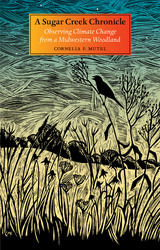
Moving between two timelines, Mutel pairs chapters about a single year in her Iowa woodland with chapters about her life as a fledgling and then professional student of nature. Stories of her childhood ramblings in Wisconsin and the solace she found in the Colorado mountains during early adulthood are merged with accounts of global environmental dilemmas that have redefined nature during her lifespan. Interwoven chapters bring us into her woodland home to watch nature’s cycles of life during a single year, 2012, when weather records were broken time and time again. Throughout, in a straightforward manner for a concerned general audience, Mutel integrates information about the science of climate change and its dramatic alteration of the planet in ways that clarify its broad reach, profound impact, and seemingly relentless pace.
It is not too late, she informs us: we can still prevent the most catastrophic changes. We can preserve a world full of biodiversity, one that supports human lives as well as those of our myriad companions on this planet. In the end, Mutel offers advice about steps we can all take to curb our own carbon emissions and strategies we can suggest to our policy-makers.
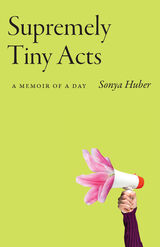
“I think we have to get to the real, to catch the facts we have, to hold on to what we see. . . .in this time where lies are currency,” Sonya Huber writes in her book-length essay Supremely Tiny Acts: A Memoir of a Day. On the theory that naming the truths of quotidian experience can counter the dangerous power of lies, she carefully recounts two anxiety-fueled days one fall. On the first, she is arrested as part of a climate protest in Times Square. On the other, she must make it to her court appearance while also finding time to take her son to get his learner's permit. Paying equal attention to minor details, passing thoughts, and larger political concerns around activism and parenting in the Trump-era United States, Huber asks: How can one simultaneously be a good mother, a good worker, and a good citizen? As she reflects on the meaning of protest and on whiteness and other forms of privilege within political activism, Huber offers a wry, self-aware, and stirring testament to the everyday as a seedbed for meaningful change.

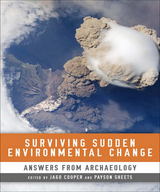
Many disasters originate from a force of nature, such as an earthquake, cyclone, tsunami, volcanic eruption, drought, or flood. But that is only half of the story; decisions of people and their particular cultural lifeways are the rest. Sociocultural factors are essential in understanding risk, impact, resilience, reactions, and recoveries from massive sudden environmental changes. By using deep-time perspectives provided by interdisciplinary approaches, this book provides a rich temporal background to the human experience of environmental hazards and disasters. In addition, each chapter is followed by an abstract summarizing the important implications for today's management practices and providing recommendations for policy makers. Publication supported in part by the National Science Foundation.
READERS
Browse our collection.
PUBLISHERS
See BiblioVault's publisher services.
STUDENT SERVICES
Files for college accessibility offices.
UChicago Accessibility Resources
home | accessibility | search | about | contact us
BiblioVault ® 2001 - 2024
The University of Chicago Press









